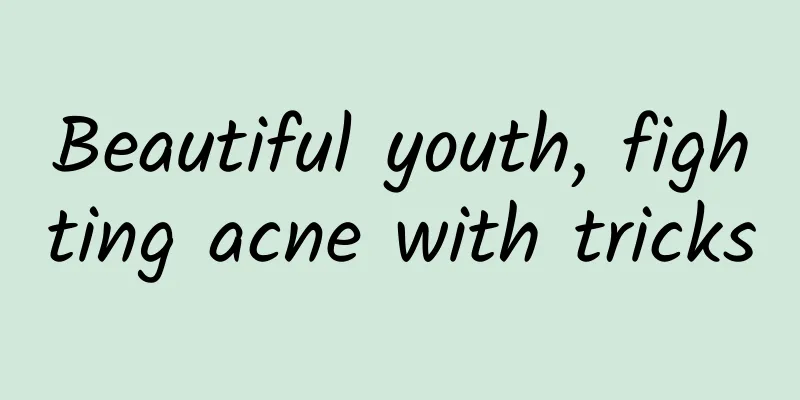Beautiful youth, fighting acne with tricks

|
As the saying goes, "Youth is not without acne". Who's youth has not left behind the shadow of acne? And we are always "scared of acne" because acne has a long growth cycle, is difficult to heal, and is prone to recurrence. In severe cases, it lasts from adolescence to youth, which seriously damages our skin barrier in the long run. Therefore, "fighting acne" has become a deep growth memory for every adolescent boy and girl with acne. Know Yourself and Know Your Enemy 1. Say "acne" accurately Acne is mainly caused by infection with anaerobic Propionibacterium acnes, so it is medically called "acne". It is a common skin problem that is particularly prone to occur during adolescence and mainly occurs on the face, back and chest. Usually, the pores on the face are larger than those on other parts of the body, so facial acne is more common. 2. Causes of acne 3. Types and characteristics of acne Acne can be divided into many types according to different characteristics and causes. 4. Does youth bring about acne? Puberty is a period of drastic changes in hormone levels. Puberty generally starts at the age of 10 to 13 and lasts until around 18 to 19. During this stage, the body undergoes gonadal development and increased hormone secretion, especially the level of male hormones begins to rise, which promotes active and increased sebum secretion. Blockage of the opening of the sebaceous glands in the hair follicles is an important cause of acne. When the hair follicles are blocked, an "anaerobic or hypoxic" environment is formed, and anaerobic Propionibacterium acnes multiplies in large numbers, causing inflammation and forming acne. In addition to adolescence, the menstrual period is also a high-incidence period for acne. The decrease in estrogen levels during menstruation will lead to a relative increase in androgen levels, which may cause acne. In addition, stress, poor eating habits, lack of sleep and external environmental factors may also affect the formation of acne. 5.Are men more likely to get acne than women? During puberty, men are more prone to acne than women because they have higher levels of male hormones. The increase in male hormones stimulates the sebaceous glands to secrete more oil, leading to clogged hair follicles and the formation of acne. In addition, boys usually have thicker skin and larger pores, which makes it easier for oil to accumulate on the skin surface and increase the risk of acne. Tips for getting rid of acne According to the type and characteristics of acne, its type and cause of formation can be identified, and appropriate treatment methods can be selected to treat the root cause of acne formation to achieve the effect of curing the root cause. In addition, identifying the cause can help prevent the recurrence of acne. By avoiding or controlling these pathogenic factors, the risk of acne recurrence can be reduced. 2. Understand the level of acne and treat it accordingly (1) Choose the appropriate treatment (2) Pay attention to maintenance treatment After the acne lesions are eliminated, it is very important to maintain treatment. You can use retinoic acid creams and 15% azelaic acid gel for 3 to 6 months. If there are acne scars, you can use products with milder concentrations of azelaic acid and salicylic acid to lighten the pigment. 3. Develop good care habits to stabilize skin (1) Facial cleansing After moistening your face, wash it with an oil-control cleanser (at night) or an amino acid cleanser (in the morning). When cleansing your face, use warm water as much as possible, and rub it into a rich foam before applying it to your face and massaging it for about 1 minute. After washing for 3 to 5 minutes, rinse off the foam with clean water, and then dry your face with a clean gauze towel. (2) Exfoliation and cleansing Perform exfoliation treatment once a week, using a mild gel-type exfoliating product to dissolve the connection between old cuticles and skin cells. (3) Hydration and oil balance Balancing oil by replenishing water can maintain the skin's water-oil ratio at a normal 2:1, which helps keep the skin's pores breathing normally. Note: Frequent cleansing and oil control are not always effective. Excessive cleansing may damage the skin barrier, leading to an imbalance of water and oil, which in turn aggravates acne. In addition, long-term use of antibiotic ointments may lead to drug resistance in the skin, disrupt the balance of skin flora, and cause multiple infections. Tips for fighting acne 1. Avoid squeezing pimples Squeezing pimples may lead to bacterial infection and worsening inflammation, which may cause scarring. 2. Avoid using cosmetics that are too oily or contain heavy metals Excessive oil can clog pores, leading to the formation and worsening of acne. Choose oil-free or water-based makeup and make sure to clean and remove makeup in time; heavy metals (such as lead and mercury) are toxic to the skin and can cause inflammation and irritation, which can worsen acne. 3. Pay attention to your diet There is a certain correlation between diet and the formation of acne. Try to avoid consuming too much high-sugar and high-fat foods, and increase the intake of foods rich in vitamins and antioxidants. 4. Maintain healthy living habits Maintaining good lifestyle habits, such as regular exercise, adequate sleep, and stress management, can help maintain overall physical health and healthy skin. 5. Seek professional help If the acne problem is severe or cannot be controlled through self-care, it is recommended to consult a professional dermatologist and do not blindly seek treatment from non-professional beauty institutions. |
<<: Orange warning! It’s not too late for those who use sunscreen to know this →
>>: The road to kidney disease is long and the symptoms are always there
Recommend
What are the differences between normal leucorrhea and abnormal leucorrhea?
The normal leucorrhea of women is usually white...
Who is Yuan Hongdao in Joy of Life? Who is Yuan Hongdao in Joy of Life?
What is the identity of Yuan Hongdao in Joy of Li...
What to do if the nipple is inflamed and has pus spots
Nowadays, more and more patients suffer from nipp...
Why did my second uncle become disabled after taking an injection? Many people had this injection when they were young.
A short video titled "After returning to the...
How to store crabs if you don't eat them? How long can you store crabs if you don't eat them?
We all know that crab is a popular delicacy. It c...
How to exercise for middle-aged women
Now we are paying more and more attention to our ...
What to do if you are pregnant with uterine prolapse
The uterus is located in the female abdomen. It i...
Pre-pregnancy check items for women
With the development of science, many young peopl...
Do you know how thick the endometrium is during pregnancy?
Once a person becomes pregnant, the thickness of ...
I drink a lot of water, so why is my skin still dry?
Netizen question: My skin has always been dry, an...
Are birth control pills effective for 72 hours?
There are many types of contraceptive pills. Thei...
Is the high-priced "baby water" really healthy or a "tax on IQ"? The secret is revealed for you →
Those who have children at home may find that the...
Factors that cause scanty and dark menstrual blood
There are many women who have little menstrual fl...
Morning sickness, is it a boy or a girl?
Morning sickness is a normal physiological need o...









